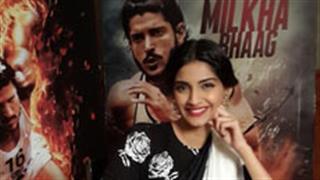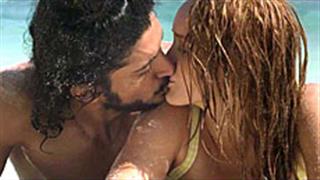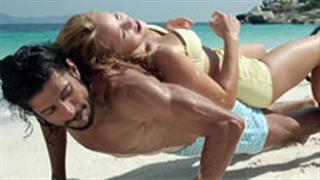You've completely changed yourself into Milkha Singh? How did that happen?
I don't know. I was inspired by Milkhaji's life, his struggle, his triumph. There was so much to take from his experiences.

Your accent, dancing and body-language are dead-on?
There was a training coach, a track-and-field coach, a dialogue coach and a physio-therapist. When you have the right people around you, the job becomes easier. I was fortunate to work with people who showed me the way. I was very patient, and so were they.
Honestly whatever I did is beyond explanation. I distinctly remember when Rakeysh Omprakash Mehra narrated the subject to me I immediately knew it was something that had to happen. And that determination, that I had to do it, remained with me all through.

While researching you got close Milkha Singh. What did he and you feel about the performance?
On seeing the film Milkhaji was emotionally moved. That was quite visible. He just hugged me. Words failed him. As for me, I am too close to the role to answer this.
I can only try and understand my performance from the way other people have reacted to me and the way audiences connect with the character. Honestly, the performance is a culmination of the many choices that were made during the process of making the movie.
What was your main area of interest while doing Milkha?
I was most amazed by his spirit. And that spirit is latent within us. It takes a story like Milkhaji's to awaken that spirit within all of us. What I learnt the most is the power of forgiveness.
Milkhaji taught me that you can't move on in life with the baggage of negativity and ill-will. You can't be the flying Sikh with all that burden. So in a way the running is a metaphor for an unburdened spirit of forgiveness.

The running scenes are bloody authentic
Yeah, there was blood on the tracks... my blood (laughs). The running was very difficult. Even the scenes were I had to be stationary on the tracks were very difficult. But I must tell you, I really enjoy outdoor sports and games. I love playing several games.
So my application to Milkhaji's role didn't come across as fake. It wasn't an alien world for me. And honestly the seven months that went into the training was crucial. Now that you've seen the film you know every race tells a story.
I just needed to focus on the actual scenes and not on how I looked while running. While shooting I wanted to focus on the instructions froom Rakeysh and not the trainers.

What do you feel about the plight of sportspersons who are not cricketers in our country?
I had the good fortune of meeting some sportspersons for this film. And I can only say there's a lot that needs to be done for them.
The opportunities that sportspersons get outside the world of cricket are very few. The sports events like an Olympics happens once in several years.
They spend all their time traning for that moment sacrificing all their personal time for that mpment. I met Krishna Poonia who told me she had to stay away from her child for two years while preparing for an event. They should get backa lot more for what they sacrifice. But they don't.

How much of a difference do you think Bhaag Milkha Bhaag would make to the mindset on sportspersons?
Athltes are bound to be inspired by this movie. But I hope sports federations should start getting a lot more sensitive towards athletes and nurture them correctly. That can only happen if they don't have to stress about their livelihood. Hopefully, this film will make people think.
Is there a fear that future roles would not be able to equal BMG?
No not really. Fortunately I've done work in the past that has been appreciated. It's crucial to shed skin and move on. But you're right. Milkha is a life-changing experience for me.
It will always remain precious to me. But I can't allow myself to rest on this role alone. My next film is Saket Chowdhary's Shaadi Ke Side Effects with Vidya Balan. We're more or less done. It's a completely different planet from BMB, like Mercury and Pluto.

What was it like shooting with Ms Balan?
It was like returning to a world that I associate with. To some extent doing Shaadi Ke Side Effects helped me to get out of Milkha's skin. Within two months of shooting BMB we moved to this film. It's a very sweet scipt. When producer Pritish Nandy and director Saket Chowdhary told me the story I loved it. It's a wonderfully sweet script. And Vidya was a terrific co-star.
Director, actor, singer... did you ever imagine your career would pan out in this exceptional way?
I don't think one can ever script one's life. One can only hope to realize one's dreams. I don't allow myself to be bogged down by self-expecations. But it will have to be one thing at a time. If I am directing, then I won't be acting.
The emotions I feel while acting are very different from what I feel when I am directing. Actors have done both simultaneously in the past. I've tremendous respect for them. I can't. As for singing, it is an extension of my acting vocation.

Why didn't you sing in BMG?
The cultural percepective of the theme was entirely alien to my vocal chords. I wanted to leave the singing to those who understood the culture and historical background.
When are you directing next?
I don't know! I have to give myself that space to decide what I want to do. At the moment it's very important for me to spend time with the family. I feel if I take time off I'll know what I want to do next.

Now that Milkha has been immortalized what have you taken away from Milkha?
Whatever I've mananged to do in this movie is motivated and inspired by this man called Milkha Singh. He has given me a lot of strength. He witnessed events such as the violence after Partition that I had no clue about. His childhood is far removed from mine.
I just drew upon a sense of personal loss to deal with his trauma. The most difficult scenes for me were when Milkha goes back to his home in Pakistan to confront his past.
Those scenes demanded every ounce of memory of loss within me. I still didn't come anywhere close to what Mailkhaji must have felt. But I tried.

And we cried?
Amen.




















